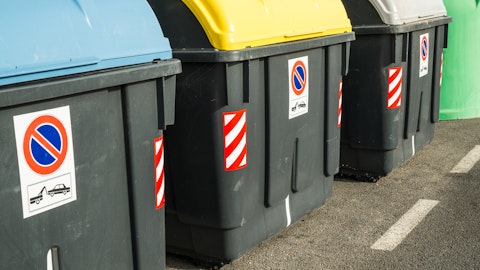Mark Duff: That’s exactly right, Ross. It’s been a world waiting game. COVID has thrown a big wrench, as I’ve mentioned 100 times into the procurement process and there’s a lot of waiting for procurement. Everything is funded or at least not everything of funded but the significant funding out there, a significant unspent funding out there way more than ever. And we anticipate that to continue and the missions are all very well defined. They just got to keep moving with goodness procurements out.
Ross Taylor: Okay. Well, you’re doing a great job at company and it seems like it has really turned the corner and I congratulate you and your team on that.
Mark Duff: Great. Thanks, Ross. Appreciate your support.
Operator: The next question is coming from Aaron Warwick from Breakout Investors.
Aaron Warwick: I want to take you back on what Ross said on the congratulations and that future certainly looks bright. I wanted to also follow up on something you talked about, just to make it clear because there’s been a lot of confusion, I think, among the investor community. But I just want to reiterate. It sounds like regardless of what happens with the DOE’s decision as it relates to ITDC, they’re under an obligation to get the vitrification plan up and running and therefore, at some point, getting the secondary waste to you guys. Is that accurate?
Mark Duff: That’s a true statement. Absolutely. The Bechtel has the job right now as a separate contract to get it up through hot testing and then they turn it over to the ITDC winner or something like that. And that’s the current approach that could change and they continue to tweak it or add more time to Bechtel or something like that. But a mid-’24 time frame that needs to be — one would assume that DOE would have a contractor on board to support that turnover once that plant is hot.
Aaron Warwick: Right. That’s what I was thinking too that — so it seems likely they’ll get this result without a third bidding process. But even if they do, they’re on that time line for August 2025 at the absolute latest.
Mark Duff: Yes.
Aaron Warwick: Okay, good. Sticking with Hanford, I attended a public meeting. I think it was in late May, maybe early June, had all of the entities involved, the government entities involved with the Hanford project there. And it’s quite surprising because I had always gotten the impression that…
Mark Duff: Aaron, I think we lost you.
Aaron Warwick: Like that was going to be part of their solution. Have you guys sort of seen this change as well and I’d assume you see that positively?
Mark Duff: I’m sorry, Aaron. We lost a big chunk of your question there. Could you — the last couple of sentences — could you repeat that?
Aaron Warwick: Oh, yes. Sorry about that. Yes. So at this conference, this public meeting, the Department of Ecology seemed to have changed their opinion on where they’re extremely positive — to be reluctant. Have you seen that change in position from them and I assume have received that positively?
Mark Duff: You broke up again. I’m afraid, Aaron but I think what you’re asking is how has the state of Washington evolved in regards to CVI and routing. Yes. Yes, the Ecology. They have come around. They had some detention in the past years but we’ve had some really good meetings with Ecology. I think this is just speculation on my part is the — when we start looking at budgets and time frames and reality in regardless of how long it’s going to take the cleanup Hanford, the numbers now are between $400 million and $600 million as defined in some different reports that something has to be done to address that budget requirement and the time frame that that’s associated with. And I think the Ecology has come around that vitrification still is their preferred approach for treatment that grouting has to be in that mix.
And I think they’ve embraced that. The meetings we’ve had with them have been very supportive and it does seem like it is making — they’re making progress in embracing that as part of the solution.
Aaron Warwick: Well, I’m certainly not going to argue with that. But I would point out that as it relates to vitrification being their preferred process, they did mention that specifically that vitrification for on-site disposal is necessary but they seem to be pleased with the fact that the TBI would be taking the waste out of the state. So I think I’m not going to say that they favor TBI more than vitrification but they seem to be totally okay with that now. And I wonder how much of that — I mean, perhaps has nothing to do with that at all. But it seems like another party that sort of come on board. It’s, obviously, you have this partnership now with the labor union. So I mean, it seems to be that every government entities are now on board with TBI. Is that your sense as well?




